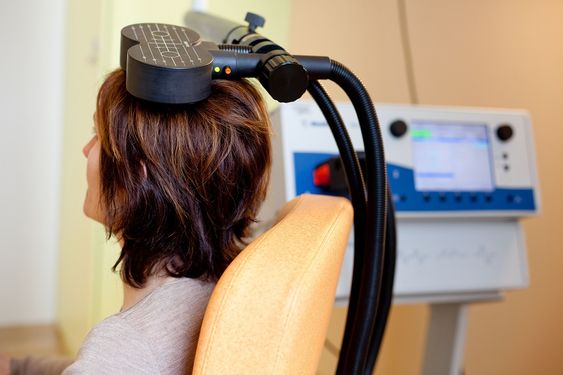Transcranial Magnetic Stimulation (TMS) for Anxiety: A Promising Treatment Approach

Anxiety disorders, characterized by excessive worry, fear, and debilitating symptoms, affect millions of people worldwide. While traditional treatments such as medication and therapy have proven effective, some individuals may experience limited relief or intolerable side effects. In recent years, transcranial magnetic stimulation (TMS) has emerged as a promising alternative treatment for anxiety. This article explores the potential of TMS in managing anxiety disorders, its effects on the brain, research studies supporting its efficacy, and the scope of its application in the field of mental health.
Understanding TMS Therapy:
Transcranial Magnetic Stimulation is a non-invasive procedure that uses magnetic fields to stimulate specific regions of the brain. By applying magnetic pulses to the prefrontal cortex, TMS modulates the neural activity, targeting the areas associated with anxiety symptoms. The procedure is typically performed in outpatient settings and involves multiple sessions over several weeks.
Research Studies and Efficacy:
Anxiety Disorders:
Studies examining the effects of TMS on anxiety disorders, including generalized anxiety disorder (GAD), panic disorder, and post-traumatic stress disorder (PTSD), have reported promising results. In a systematic review conducted by Brunoni et al., TMS was found to have a significant positive impact on anxiety symptoms in patients with anxiety disorders, with improvements lasting beyond the treatment period.
Comorbidity with Depression:
Since anxiety and depression often coexist, TMS has also shown promise in treating depressive symptoms associated with anxiety disorders. Many individuals with anxiety disorders experience co-occurring depression, and TMS therapy has demonstrated effectiveness in managing both conditions simultaneously.
Obsessive-Compulsive Disorder (OCD):
TMS has shown potential as a treatment for obsessive-compulsive disorder (OCD), a condition characterized by intrusive thoughts and repetitive behaviors. Research studies have reported improvements in OCD symptoms following TMS therapy, particularly when targeting specific brain regions involved in the disorder.
Mechanisms of Action:
TMS exerts its therapeutic effects by modulating neural activity and connectivity within the brain. By stimulating the prefrontal cortex, TMS can regulate abnormal brain activity associated with anxiety disorders. The magnetic pulses used in TMS alter the excitability of neural circuits, promoting a rebalancing effect and potentially reducing anxiety symptoms.
Safety and Side Effects:
TMS is considered a safe treatment option, with minimal risk of serious adverse events. The most commonly reported side effects include mild scalp discomfort or headache at the treatment site, which are typically transient and diminish over time. It is crucial for individuals considering TMS therapy to discuss potential risks and side effects with their doctor to make an informed decision.
Clinical Implementation and Future Directions:
TMS therapy is currently offered in specialized clinics and medical centers. During the first appointment, the doctor will assess the individual’s suitability for TMS treatment, considering factors such as medical history, previous treatment response, and the specific type of anxiety disorder. Treatment parameters, including frequency, intensity, and duration of sessions, are customized based on the patient’s needs and clinical judgment.
As research on TMS continues to evolve, further investigations are needed to refine treatment protocols, identify optimal stimulation parameters, and explore its efficacy in different subtypes of anxiety disorders. Collaborative efforts between researchers, clinicians, and mental health professionals are essential for advancing the field and expanding the accessibility of TMS therapy.
Conclusion:
Transcranial Magnetic Stimulation (TMS) holds great promise as a safe and effective treatment option for anxiety disorders. With its ability to modulate neural activity in targeted brain regions, TMS offers a non-invasive alternative for individuals who experience limited relief from traditional treatments or struggle with medication side effects. As research continues to demonstrate its efficacy, TMS therapy has the potential to transform the landscape of anxiety disorder treatment and provide hope for those seeking relief from debilitating anxiety symptoms.
1875 N Lakes Place
Meridian, ID 83646
208-846-8448


Comments are closed.